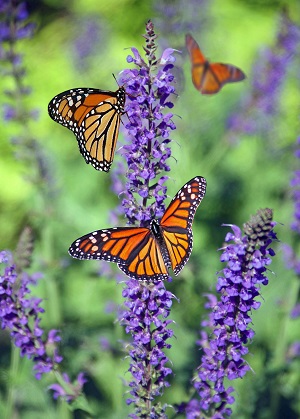
Pollinator Action Plan grows Somerville’s commitment to creating a healthy environment for pollinators – including bees, moths, and butterflies – that are vital for a flourishing urban ecosystem
The City of Somerville is thrilled to announce the formation of an Advisory Committee to work on a Pollinator Action Plan that prioritizes local pollinator health to establish and maintain a healthy and biodiverse urban ecosystem. The plan is the first of its kind in a city as densely populated as Somerville.
More than 75% of all flowering plants depend on pollination for survival, including thousands of crop species globally, but due to habitat loss and pesticide use, pollinator populations are declining in New England and worldwide.
“In Somerville, we are committed to supporting the health of all our residents, human and non-human alike,” said Mayor Katjana Ballantyne. “Municipalities have the power, and the responsibility, to support pollinators through our policies, designs, and public engagement. Our hope is that Somerville’s Pollinator Action Plan, produced in partnership with the community, will become a model for pollinator and wildlife conservation in challenging urban environments.”
The Pollinator Action Plan is part of an ambitious undertaking by the Ballantyne administration to support, protect, and maintain urban pollinator ecosystems, including Mayor Ballantyne’s signing of the Mayor’s Monarch Pledge, research collaborations with the Tufts Pollinator Initiative, and creating pollinator gardens throughout the city.
In recent years, Somerville has also passed a Native Plant Ordinance, which requires certain percentages of native species to be planted on City land; passed a Tree Preservation Ordinance, which limits the removal of healthy trees, many of which are essential food and shelter sources for pollinators; and led an ongoing public education and removal campaign to control and reduce populations of black swallow-wort, an aggressive and invasive non-native plant toxic to Monarch butterflies.
“We know from our research that dozens of pollinator species already use gardens in Somerville,” said Dr. Elizabeth E. Crone, Biology Professor at Tufts University and Somerville resident. “Creating more gardens like these will provide resources right away for these species. Additionally, more gardens will also allow new pollinator species – ones that need a little bit more green space – to move into the city.”
The Somerville Pollinator Action Plan (SPAP) is forming an advisory committee to identify ways to create the best habitat for Somerville-specific and regional pollinators and wildlife in the city. The Advisory Committee will collaborate with City staff and a consultant team composed of experts in pollination, ecology, horticulture, and the urban environment to understand the interventions that a municipality can perform to create the most nurturing environment for pollinators. To apply, please complete this form by October 21st, 2022.
Learn more at somervillema.gov/SPAP or by emailing SPAP@somervillema.gov
The City of Somerville does not discriminate on the basis of race, color, religion, age, national origin, disability, or any other protected category. Auxiliary aids and services, written materials in alternative formats, and reasonable modifications in policies and procedures will be provided to qualified applicants and employees with disabilities free of charge, upon request.
Individuals with disabilities who need auxiliary aids and services for effective communication, written materials in alternative formats, or reasonable modifications in policies and procedures, in order to access the programs and activities of the City or to attend meetings, should contact the City’s ADA Coordinator, Adrienne Pomeroy, at 617-625-6600 x2059 or apomeroy@somervillema.gov.















Reader Comments